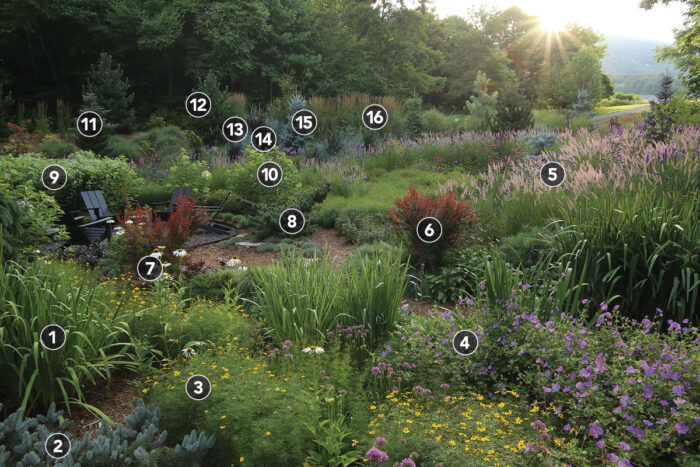
In the article Designing a Stylized Meadow (Fine Gardening #209), garden designer Jay Sifford takes readers through the steps he used to turn a sloped front yard into a lush, naturalized garden in just a few short years. After purchasing a piece of property in the mountains of North Carolina, Jay soon discovered that the septic system for his yet-to-be-built home would need to be put in the front yard due to wetland restrictions. As a result, dozens of trees had to be removed. The challenge was a welcome one, as Jay had never owned a full-sun garden, even though he had designed several of them for clients over the years. It seemed that a meadow filled with plants with shallow root systems that would not grow into septic drain lines was the most appropriate and ecologically responsible way to proceed; however, Jay hesitated because many created meadows look messy.
Instead, he set out to build a landscape that was eye-catching and cohesive—something that was pleasing to the eye year-round. Additionally, he wanted a garden that was attractive to birds and pollinating insects. With lots of contemplation, Jay decided he wanted a “stylized meadow.” After laying out the plan for the garden, Jay dove into plant selection and placement. The following is a list of native and ornamental species that make up the bulk of the perennials, trees, and shrubs that have taken root in his garden. The array is a beautiful blend that looks good during all 12 months.
 See a Video Tour of this Garden
See a Video Tour of this Garden
Get a behind-the-scenes tour of a beautiful mountain landscape.
Traditional vs. Stylized Meadow Gardens
Learn more about the differences between a stylized meadow and a traditional meadow design.
Photo #1 (photo above)
- ‘Purple Flame’ blue flag iris (Iris versicolor ‘Purple Flame’, Zones 3–9)
- ‘Glauca Prostrata’ blue spruce (Picea pungens ‘Glauca Prostrata’, Zones 3–7)
- ‘Zagreb’ coreopsis (Coreopsis verticillata ‘Zagreb’, Zones 3–9)
- Rozanne geranium (Geranium ‘Gerwat’, Zones 5–8)
- ‘Karley Rose’ fountain grass (Pennisetum orientale ‘Karley Rose’, Zones 5–9)
- ‘Orange Rocket’ barberry (Berberis thunbergii ‘Orange Rocket’, Zones 4–9)
- ‘White Swan’ coneflower (Echinacea purpurea ‘White Swan’, Zones 3–8)
- ‘Fukuzumi’ Japanese white pine (Pinus parviflora ‘Fukuzumi’, Zones 5–7)
- Mountain mint (Pycnanthemum muticum, Zones 4–8)
- ‘Phantom’ panicle hydrangea (Hydrangea paniculata ‘Phantom’, Zones 3–9)
- ‘Horstmann’s Silberlocke’ Korean fir (Abies koreana ‘Horstmann’s Silberlocke’, Zones 5–7)
- ‘Oregon Green’ Austrian pine (Pinus nigra ‘Oregon Green’, Zones 4–8)
- ‘Blue Dune’ lyme grass (Leymus arenarius ‘Blue Dune’, Zones 4–9)
- Panther® ninebark (Physocarpus opulifolius ‘N5’, Zones 3–8)
- ‘Bonny Blue’ Colorado blue spruce (Picea pungens ‘Bonny Blue’, Zones 3–8)
- ‘Karl Foerster’ feather reed grass (Calamagrostis × acutiflora ‘Karl Foerster’, Zones 4–7)
Photo #2
- Rozanne geranium (Geranium ‘Gerwat’, Zones 5–8)
- Weeping white spruce (Picea glauca ‘Pendula’, Zones 2–7)
- ‘Karley Rose’ fountain grass (Pennisetum orientale ‘Karley Rose’, Zones 5–9)
- ‘Helga’ Austrian pine (Pinus nigra ‘Helga’, Zones 3–7)
- Heather (Calluna cv., Zones 4–7)
- Dwarf balsam fir (Abies balsamea ‘Nana’, Zones 3–6)
- ‘Zafiro’ blue spruce (Picea pungens ‘Zafiro’, Zones 3–7)
- Phenomenal® lavender (Lavandula intermedia ‘Niko’, Zones 5–9)
- Blazing star (Liatris spicata, Zones 3–9)
- ‘Bonny Blue’ Colorado blue spruce (Picea pungens ‘Bonny Blue’, Zones 3–8)
- ‘Karl Foerster’ feather reed grass (Calamagrostis × acutiflora ‘Karl Foerster’, Zones 4–7)
- ‘North Star’ white spruce (Picea glauca ‘North Star’, Zones 2–7)
- ‘Oregon Green’ Austrian pine (Pinus nigra ‘Oregon Green’, Zones 4–8)
Photos: Danielle Sherry
To see more of Jay’s garden, check out his Garden Photo of the Day submissions:

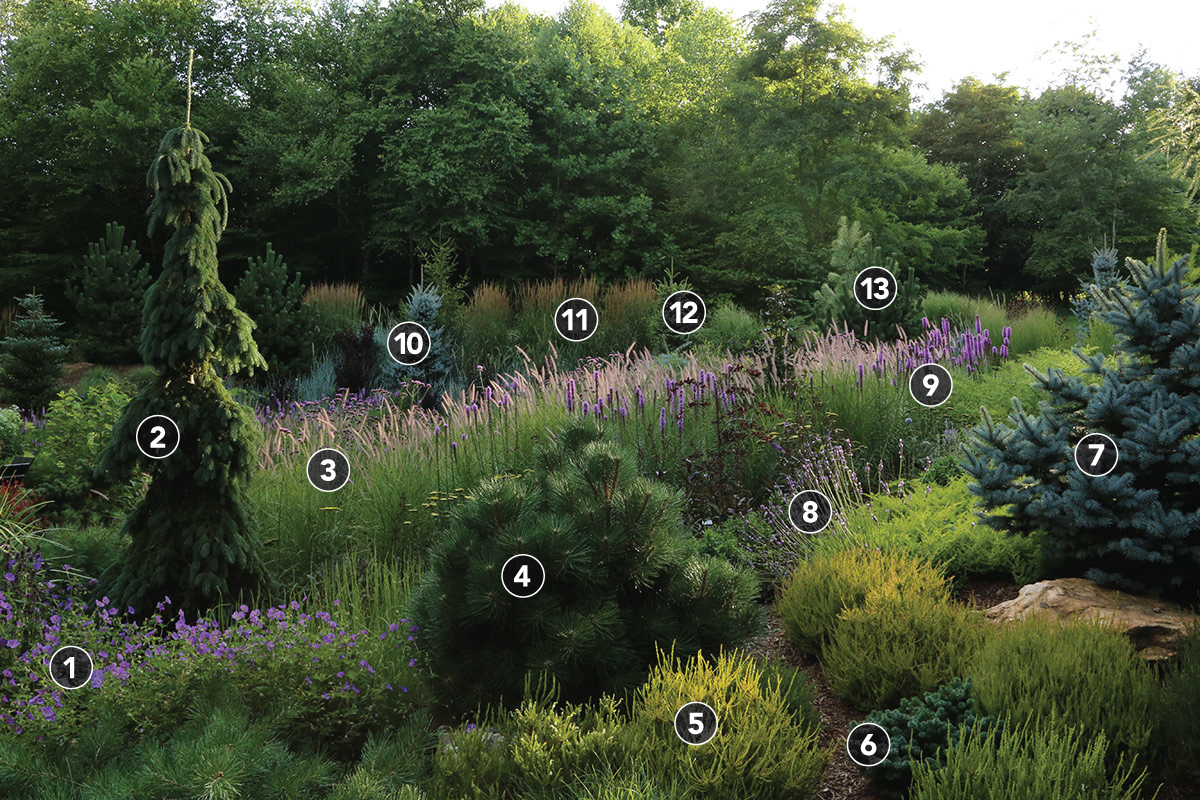
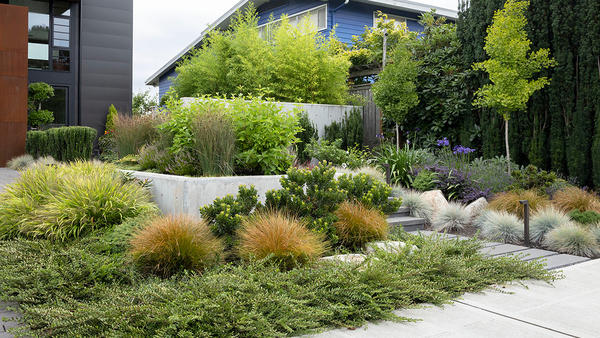


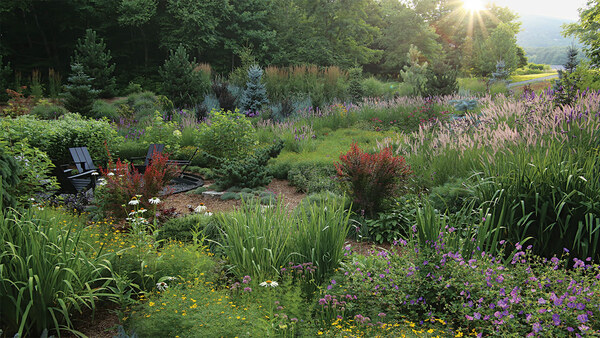

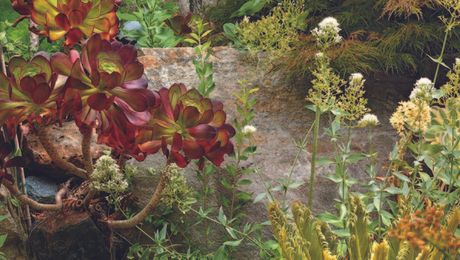
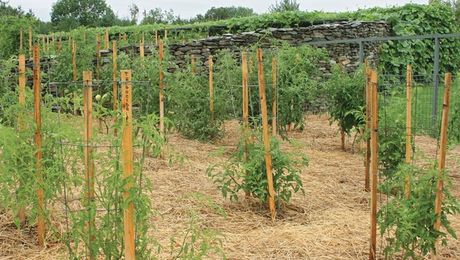









Comments
I would love to see a follow article on the ongoing maintenance and care for this garden. How does Jay suppress weeds or edit volunteers or aggressive spreaders? I have never met a truly "low-maintenance" garden, and in certain zones and areas volunteer plants (weeds) can be quite difficult to keep out or at bay.
Hi. My garden maintenance consists of hand cutting the grasses and perennials, beginning in very early March. This takes me a couple of weekends. After that, I weed every Saturday in season. I can weed the entire garden in 45 minutes. Most of the plants in the garden have never been watered other than rain. I consider that to be a fairly low maintenance schedule.
Log in or create an account to post a comment.
Sign up Log in